|
|
|
Sort Order |
|
|
|
Items / Page
|
|
|
|
|
|
|
| Srl | Item |
| 1 |
ID:
160931
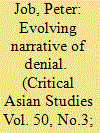

|
|
|
|
|
| Summary/Abstract |
As research by the Commission for Reception, Truth and Reconciliation in East Timor documents, the years 1975–1980 constituted the worst period of the Indonesian occupation of East Timor, during which grave human rights took place involving a high loss of life. In Australia, the government headed by Prime Minister Malcolm Fraser (1975–1983) sought to present itself as a supporter of human rights and the international rule of law. It also prioritized relations with the Suharto regime, which it saw as key to its policy position in Southeast Asia. These two positions came into conflict due to the Indonesian invasion of East Timor. The Fraser government therefore worked to propagate a narrative concerning East Timor which denied the seriousness of the situation, distorted the historical narrative, deflected blame from Indonesia, and depicted the Australian position as principled and realistic. This paper examines the development of this narrative as events progressed and information concerning the crisis in East Timor came to the attention of the outside world. It also examines how the Fraser government employed this narrative internationally in order to protect the Suharto regime from scrutiny.
|
|
|
|
|
|
|
|
|
|
|
|
|
|
|
|
| 2 |
ID:
160926
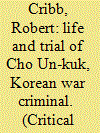

|
|
|
|
|
| Summary/Abstract |
In 1946, a British military court in Singapore tried a Korean national named Cho Un-kuk for war crimes against Allied prisoners of war on the Thailand–Burma Railway during the Second World War. The evidence against Cho was scanty, but he had been part of a group of Korean guards notorious for brutality towards prisoners. In expedited proceedings relying heavily on affidavit material, Cho was found guilty and sentenced to fifteen years in prison. The trial revealed both Cho’s unexpected transnational background as a dentist in pre-war British India and the complex position of Korean guards on the Railway. Often characterized as universally brutal as a result of their own ill-treatment by the Japanese colonial system, the guards responded in many different ways to the pressures and opportunities of service subordinate to the Japanese military. After sentencing, Cho served time in Singapore and Japan. He left prison a broken man in 1955. Like other Koreans who had been in Japanese military employment, he was spurned by other Koreans as a collaborator. Only in 2006, after his death, was he officially recognized as an unwilling conscript into Japanese service. His case illustrates the difficulty of distinguishing victims and perpetrators in the tangled circumstances of the Second World War.
|
|
|
|
|
|
|
|
|
|
|
|
|
|
|
|
| 3 |
ID:
160930
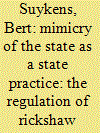

|
|
|
|
|
| Summary/Abstract |
Around half a million cycle rickshaws are currently active in Dhaka, Bangladesh. With only 86,000 official licenses available, different types of organizations supply licenses to most rickshaw drivers. These non-official licenses mimic the language of the state. This article argues that while these licenses appear as part of non-state, hybrid, or twilight institutions, they in fact constitute a state practice. Based on approximately 200 semi-structured interviews at six locations in Dhaka and offering a conceptualization of the Bangladesh state as a party-state, the article shows that the operation of non-official rickshaw licenses and the mimicry entailed is an inherent part of party-state governance, one which is not morally neutral. While most respondents saw the everyday benefits of non-official licenses in the absence of sufficient official ones, the latter remained the most prized and, if made available, respondents agreed that the former would become redundant.
|
|
|
|
|
|
|
|
|
|
|
|
|
|
|
|
| 4 |
ID:
160927
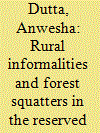

|
|
|
|
|
| Summary/Abstract |
It has now been well established that forests in South Asia are postcolonial political zones. In Assam, in northeast India this was accomplished through the colonial project of converting jungles into Reserved Forests. Using the politics of dokhol (“to grab or occupy by force”) as an entry point, this article examines the comparative epistemologies of squatting and informality in urban and rural contexts. My intent is to unpack the everyday practice, maintenance, and sustenance of dokhol within the reserved forests of Bodo Territorial Autonomous District. This entails an extension of existing scholarship on formal-informal dichotomies in relation to rural squatters, in particular those on forestland. I do so by combining an ethnographic study of dokhol by rural squatters with three influential strands of critical scholarship on urban squatting, namely Partha Chatterjee’s “political society,” Asaf Bayat’s “quiet encroachment,” and Ananya Roy’s take on planning and deregulation. This article advances the case of rural informalities and opens a dialogue between the two forms of informalities – rural and urban, especially in the context of South Asia.
|
|
|
|
|
|
|
|
|
|
|
|
|
|
|
|
| 5 |
ID:
160928
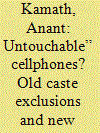

|
|
|
|
|
| Summary/Abstract |
This paper presents a fresh perspective on the complicated relationship between digital communication technologies and historically disadvantaged castes such as Dalits in peri-urban Bangalore (Bengaluru), India, a city popularly perceived as India’s “Silicon Valley.” Based on interviews with Dalit household members, entrepreneurs, and political activists, the study examines whether mobile phones have been insufficiently harnessed by Dalits in the region to overcome historic deprivation, or whether they may have even assisted in the reinforcement of caste-based exclusion. The paper uses oral histories and draws from feminist perspectives on technology to demonstrate how the contemporary socio-technological outcomes among Dalits in peri-urban south Bangalore is a result of a convergence between three elements – the durability of caste in peri-urban metropolitan India, the social construction of the usage of information communication technologies (ICTs), and myopia in the conventional understanding of the digital divide in India. In the process of disentangling this convergence, the paper offers a new perspective on the relationship between caste, ICTs, and development policy. The paper ultimately argues for a re-examination of the idea of a digital divide and the development assumption that access to new technologies will further positive development outcomes.
|
|
|
|
|
|
|
|
|
|
|
|
|
|
|
|
| 6 |
ID:
160929


|
|
|
|
|
| Summary/Abstract |
Analyzing photos and narratives of the “widows’ battalion” in Aceh, Indonesia that appeared in international and local print media between 2000 and 2002, this article traces how images of female combatants initially provided evidence of a uniformed, armed ethno-nationalist movement motivated by past state violence and linked to historical legends of women involved in armed resistance to colonialism. Subsequently, the heroines were recast as immoral young women pursuing inappropriate sexual relationships with the occupying military. The problems of intelligence gathering, double agents, and the indeterminate zone of overlap in which male soldiers collaborated in the past were rewritten as a problem of sexual or intimate relations that violated religious and cultural norms. In Aceh, the affective power and complexity of women’s positioning as both victim and combatant is fueled by the invocation of the iconic heroines of the anticolonial resistance and ideas about international human rights. Images and narration of the widows’ battalion appear to champion female combatants past and present, but in fact, contribute to the consolidation of the power of male commanders and combatants in the resistance movement. Analyses of human rights photography must consider the affective power of images beyond engaging the empathy of distant spectators to consider their role in conflict dynamics.
|
|
|
|
|
|
|
|
|
|
|
|
|
|
|
|
|
|
|
|
|